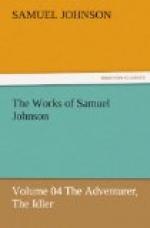It has been the policy of all nations to preserve, by some public monuments, the memory of those who have served their country by great exploits: there is the same reason for continuing or reviving the names of those, whose extensive abilities have dignified humanity. An honest emulation may be alike excited; and the philosopher’s curiosity may be inflamed by a catalogue of the works of Boyle or Bacon, as Themistocles was kept awake by the trophies of Miltiades.
Among the favourites of nature that have from time to time appeared in the world, enriched with various endowments and contrarieties of excellence, none seems to have been exalted above the common rate of humanity, than the man known about two centuries ago by the appellation of the Admirable Crichton; of whose history, whatever we may suppress as surpassing credibility, yet we shall, upon incontestable authority, relate enough to rank him among prodigies.
“Virtue,” says Virgil, “is better accepted when it comes in a pleasing form:” the person of Crichton was eminently beautiful; but his beauty was consistent with such activity and strength, that in fencing he would spring at one bound the length of twenty feet upon his antagonist; and he used the sword in either hand with such force and dexterity, that scarce any one had courage to engage him.
Having studied at St. Andrew’s in Scotland, he went to Paris in his twenty-first year, and affixed on the gate of the college of Navarre a kind of challenge to the learned of that university to dispute with him on a certain day: offering to his opponents, whoever they should be, the choice of ten languages, and of all faculties and sciences. On the day appointed three thousand auditors assembled, when four doctors of the church and fifty masters appeared against him; and one of his antagonists confesses, that the doctors were defeated; that he gave proofs of knowledge above the reach of man; and that a hundred years passed without food or sleep, would not be sufficient for the attainment of his learning. After a disputation of nine hours, he was presented by the president and professors with a diamond and a purse of gold, and dismissed with repeated acclamations.
From Paris he went away to Rome, where he made the same challenge, and had in the presence of the pope and cardinals the same success. Afterwards he contracted at Venice an acquaintance with Aldus Manutius, by whom he was introduced to the learned of that city: then visited Padua, where he engaged in another publick disputation, beginning his performance with an extemporal poem in praise of the city and the assembly then present, and concluding with an oration equally unpremeditated in commendation of ignorance.
He afterwards published another challenge, in which he declared himself ready to detect the errours of Aristotle and all his commentators, either in the common forms of logick, or in any which his antagonists should propose of a hundred different kinds of verse.




